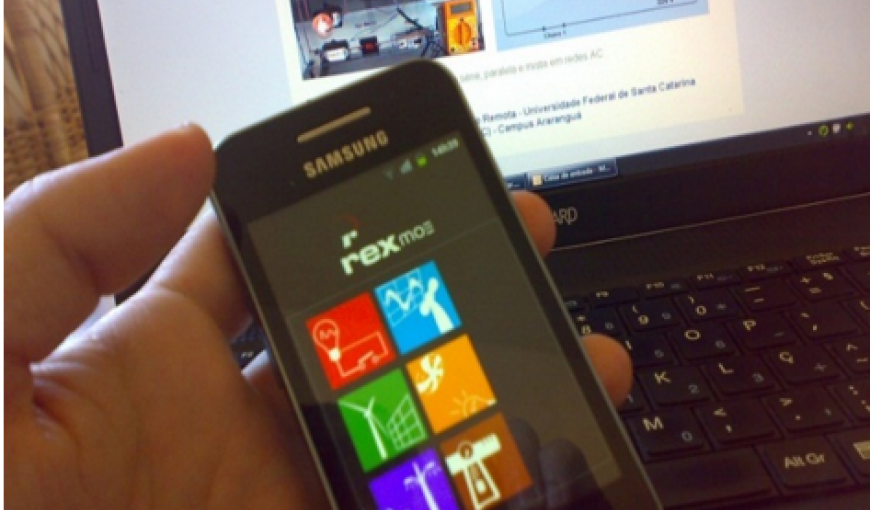R&D program develops mobile tools to health and educational professionals
Mobility may be understood, in a more restricted sense, as the use of mobile devices such as cellphones or tablets, but it may also be seen in a broader manner, such as the freedom provided by technology to carry out activities anywhere, anytime. The fact is that the use of mobile technologies with Internet access opened new possibilities for various sectors, such as the creation of innovative methods in the teaching and learning process. What is known as “mobile learning” has revolutionized the traditional way of consuming educational content, due to the student’s independence in learning when and where it is convenient, in a different dynamic than that offered by the classroom courses.
Mobile devices also have the potential to expand the performance of health professionals, who use them to facilitate assistance in remote places, assist the monitoring of patients with mobility restrictions, promote the exchange of information among peers and enable data collection at the field, among other applications.
Aiming to develop ICT solutions that may support professionals from these two areas of knowledge, RNP launched, in 2014, two R&D themed programs, one specific for Distance Learning (DL) and another for e-Health. The mission of the notices was to coordinate the development of tools that promote the innovative use of the network through solutions that potentiate remote collaboration.
Out of 104 proposals sent by the academic community, five were selected. It was a desirable condition for the solutions to be multiplatform, that is, that they could be accessed from various devices, such as desktop computers, cellphones, tablets, among others. It is the case of the Multiplatform and Open Educational Resources in the Network Work Group (WG-Remar), from the Federal University of São Carlos (UFSCar), which proposes a platform for authoring and publishing of Open Educational Resources (REA), that is, learning objects from different media with publishing license and reutilization of public use.
According to the coordinator of the WG-Remar project, UFSCar professor Delano Medeiros Beder, the student may partake in an online chemistry game at the school’s computer laboratory and finish it at home, through the tablet, because the Android and web versions are synchronized, as well as the professor, who may bring the open educational resources from home, through the smartphone.
Another Work Group, from the Federal University of Santa Catarina (UFSC), took advantage of the increased use of mobile devices among youngsters to stimulate the interest of students in STEM (Science, Technology, Engineering and Mathematics) subjects. For such, the group is dedicated to the mobile remote experimentation in the WG-MRE, proposing a solution for performance of real distance physical experiments, through devices connected to the Internet. It is possible to reconfigure an electrical circuit, for example, and rerun the experiment using MRE, facilitating learning in a more didactic manner.
The third Work Group selected by the DL notice, WG-LabVad from the Federal University of Rio de Janeiro (UFRJ), also explores the virtual laboratories theme, prioritizing the experimentation guided by logical programming. In the LabVad platform, it is possible to program Arduino electronic boards and perform the experiment in a virtual robotics laboratory. A visual programming language is also made available, which facilitates the understanding of logics by youngsters in the learning phase.
According to the researcher, the remote laboratory developed by the group has as a main advantage to shift the demand to other remote laboratories partaking in the LabVad consortium, in a transparent manner for the users. Today, the LabVad consortium has two workstations, one in UFRJ and another in the Federal University of Rio Grande do Norte (UFRN).
Mobility at the service of e-Health
In the e-Health service, the challenges are also major. With the increase in use of smartphones and tablets, there was a movement led by the Department of Health in spreading the use of mobile technology for the professionals integrating Family Health programs, for example, and the greater investment in DL, with the Open University of the Unified Health System (UNA-SUS), which provides training courses.
However, a group of researchers of the Faculty of Health Sciences at the University of Brasilia (UnB) noticed there was not a systematic information production on rare diseases, of predominantly genetic origins, which affect 65 out of 100 thousand individuals in the country.
With the launch of a national policy for attention to rare diseases, by the Department of Health in 2014, the proposal selected by RNP’s e-Health notice arose, which develops a databank on these diseases, available both in the Android and web versions. “It was a question of opportunity and necessity. There was a lot of information produced in the university and a great demand coming from patients, handlers and relatives, searching for this knowledge”, says project coordinator and UnB teacher Natan Monsores.
The MobVida Working Group, from the Telehealth Core of the Federal University of Pernambuco (Nutes/UFPE), proposes to use mobile devices as allies to facilitate care in basic attention and information gathering at field by health community agents. Researchers develop a platform of intelligent questionnaires, through which it is possible to forward the information of each treatment in an integrated manner.
“The case study chosen for the prototype was the elderly population, due to the difficulty of diagnosis of the mental health and locomotion of these patients, because many of them are bedridden and may not go to the health unit”, says UFPE professor Paula Diniz.
The R&D programs of Themed WGs were financed by the Office of Labor Management and Education in Health (SGTES), by the Higher Education Personnel Improvement Coordination (Capes) and by the National Development in Education Fund (FNDE), under RNP’s Interministerial Program.
